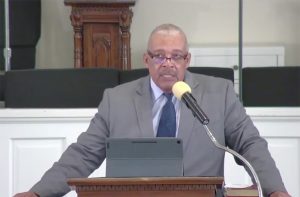Terrorstorm— Clip: The London 7/7 Attacks
This video clip from the Alex Jones documentary “Terrorstorm: A History of Government Sponsored Terrorism” details overwhelming evidence that terrorist bombings in busses and subways of London, England on July 7, 2005 which killed 56 people and injured over 700 were carried out by England's own security forces as a pretext for reducing the rights of the citizenry and creating support for the occupation of Iraq.
Following are key points mentioned in this clip:
— The London police ordered the bus which was subsequently bombed to leave its normal route and park at a different location in the city— being the only bus out of several hundred in service that morning to have its course diverted in such a way.
— London police later admitted that all four of the bombers on the three trains and bus didn't fit the characteristics of suicide bombers. They bought two-way tickets, they played games of Cricket the night before, and they had good jobs and happy families. One of the alleged suicide bombers was caught on video arguing with the ticket clerk about the price of his pass. Witnesses who were spoken to stated on the record that they believed that the bombers didn't know they had explosives in their backpacks.
— The so-called mastermind of the 7/7 bombings named Haroon Rashid Aswat was a British intelligence asset who was being protected by the MI6 (the British version of the CIA) and was under their control, as explained by former Justice Department prosecutor and FBI terror expert John Loftus on the July 29th edition of Fox News Television's “Dayside” program.
— It was reported that a witness on one of the Tube trains said that he didn't see a man with a rucksack, and after the explosion he saw metal pointing upward from the bottom of the carriage, indicating that the bomb was attached underneath the train.
— A current member of British Parliament who is a former Cabinet Minister in Prime Minister Tony Blair's government named Michael Meacher was sacked in 2003 for raising important questions on the eve of the Iraq war. He explains in an interview for the documentary: "The atrocities of the London bombings where 56 people were killed [on 7/7], it's a very convenient way of ensuring there is fear, ensuring there is control, and ensuring that those who are in the know— of course we cannot tell you because it is all secret— are in a position of extreme power."
— Jean Charles De Menezes was brutally murdered at the Stockwell Tube Station in the London Underground in 2005 by a special army unit of the police. London police were later forced to admit that their initial accounts of what had happened had been grossly distorted to make De Menezes appear to be a hostile threat. Police initially claimed that De Menezes ran from them and was wearing a heavy coat with wires sticking out as he raced onto a train before the officers gunned him down, but the truth is that it was a warm day and he was wearing a light jacket, and police came and cleared out the train car De Menez had calmly boarded and then proceeded to push De Menezes to the floor, squat on him, and kill him execution style with over ten shots to the head. Witnesses said De Menezes looked at them as if he knew them. The authorities claimed that all the surveillance cameras malfunctioned that morning but were later forced to admit otherwise. The British government was so desperate to keep the details of the shooting secret that they went so far as to arrest an ITN television journalist who had gotten a copy of what would normally be a public police report, and government whistleblowers and police have also been suspended or arrested for telling the truth about the matter.
— Israeli Army Radio was reporting that Israeli Finance Minister Benjamin Netanyahu had been warned not to leave his hotel that morning to attend a meeting less than a hundred yards away from one of the train stations that was bombed. Several weeks later the head of the Mossad (the Israeli version of the CIA) told a major German newspaper that he indeed had issued a warning to Netanyahu at 8:40 A.M., ten minutes before the first blast. Former MI5 agent David Shayler explains that in 1994, the Israeli Embassy in London was bombed, and he saw a document written by a senior MI5 officer that said he believed that Israel had bombed its own Embassy.
— All four of the supposed bomber's identification cards survived unscathed at all four events, and in one case, one of the bomber's ids was found in two separate locations.
— Most people in government are moral individuals who believe they are acting in the best interest of their country, so they need to be tricked into taking part in false flag operations by being told that they are taking part in a exercise. On the morning of the 7/7 attacks in London, there were simultaneous exercises targeting the exact same trains, the exact same bus, the exact same locations at the very same time. Peter Power who was the former spokesman for Scotland Yard told National British Television ITN news on that day about taking part in the drills, and he repeated himself to BBC Radio Five later in the evening.
— In the weeks leading up to the 7/7 attacks, Tony Blair's poll numbers had fallen to the lowest point in his seven year administration, and his labor party was sure to loose the Parliamentary elections. Support for the war was dismal, and despite the bombings which improved his approval ratings and support for the war, he was still only barely able to maintain control over the British House of Commons.
— In the wake of the bombings, Tony Blair's administration descended on the British people with a raft of tyrannical legislation, attacking the press, freedom of assembly, and setting up the conditions needed for a martial law takeover of the nation through the Civil Contingencies Act.
— The bombings took place while word leaders were meeting in Scotland, so Bush and Blair could grandstand and blame the event on Iraq, legitimizing their war. Despite the fact that the G8 Summit was coming to England on July 7, the British Government lowered the terror threat on the London Underground in early June, which conveniently lowered security.





